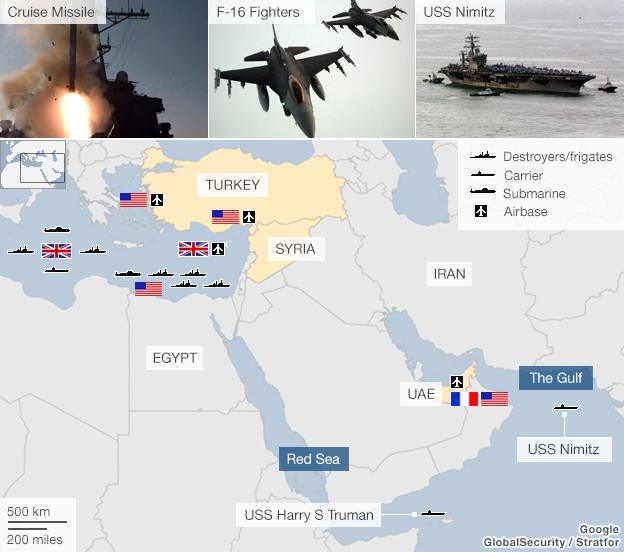UN chemical weapons inspectors resume Syria inquiry
- Published
Footage shows UN inspectors in Syria
UN chemical weapons inspectors have resumed their investigations in Syria, as speculation mounts over a possible Western strike on military targets.
The team's operation was suspended on Tuesday due to security concerns.
On Monday the team's convoy was shot at by unidentified snipers.
They are set to head to one of the sites affected by a suspected attack on the outskirts of Damascus on 21 August in which hundreds of people are reported to have died.
American and other Western leaders have sharpened their rhetoric against Syria in recent days and say they are considering military intervention.
But Iran's Supreme Leader Ayatollah Ali Khamenei warned on Wednesday that US intervention would be a "disaster" for the region.
"The region is like a gunpowder store and the future cannot be predicted," Mr Khamenei said, according to Iran's Isna news agency.
On Tuesday US Vice President Joe Biden said there was "no doubt" that the Syrian government had used chemical weapons and that it must be held accountable.
The US says it will release its own intelligence report into the incident at Ghouta, a suburb of the capital, in the coming days.
The Syrian government has strongly denied that it used chemical weapons and blames opposition fighters for the attack.
It is not clear which districts the inspectors will be visiting on Wednesday.
On Monday they visited the suburb of Muadhamiya, where they went to two hospitals and interviewed doctors and patients as well as witnesses of the attack and took away biological and environmental samples for laboratory tests.
But concerns were raised for their safety after one of their cars came under fire from unidentified gunmen as it crossed the buffer zone between government and rebel-controlled areas.
'Ready to punish'
US Defence Secretary Chuck Hagel told the BBC on Tuesday that the US military was ready to launch strikes should President Barack Obama order an attack.
President Obama is said to have made at least 88 calls to foreign leaders since the suspected attack on 21 August, and spoke to UK Prime Minister David Cameron for the second time on Tuesday.
Mr Cameron said the world could "not stand idly by", and French President Francois Hollande said France was "ready to punish" whoever was behind the attack.
The UK's National Security Council is due to convene on Wednesday to discuss possible responses, while Parliament is to be recalled on Thursday.
Mr Cameron's office said the UK government had not yet taken a decision on the specific nature of a response, but that it would be "legal and specific to the chemical weapons attack".
US defence secretary Chuck Hagel says the US military is "ready to go" in responding to Syria
On Wednesday, Russian Foreign Minister Sergei Lavrov warned that "attempts at a military solution will lead only to the further destabilisation" in Syria and the region.
Mr Lavrov emphasised the need for a political solution in a phone call to the joint UN-Arab League envoy to Syria, Lakhdar Brahimi, the foreign ministry in Moscow said.
Russia, China and Iran have previously warned against launching an attack on the war-ravaged country, where more than 100,000 people are thought to have died in two years of fighting.
Stocks have fallen on global markets and oil prices have shot up amid growing concern about an impending attack.
Intervention 'imminent'
BBC diplomatic correspondent James Robbins says the US, UK and France will now have the larger task of building as wide a coalition as possible to support limited military action.
Syrian opposition sources have said they have been told to expect a Western intervention in the conflict imminently.
"There is no precise timing... but one can speak of an imminent international intervention against the regime. It's a question of days and not weeks," AFP news agency quoted Syrian National Coalition official Ahmad Ramadan as saying.
"There have been meetings between the Coalition, the [rebel] Free Syrian Army and allied countries during which possible targets have been discussed."
Meanwhile the Arab League said it held Syrian President Bashar al-Assad responsible for the attacks and called for UN action.
But both Russia and China are permanent members of the UN Security Council and wield a veto on possible action.
China's state news agency recalled that intelligence used to justify the 2003 invasion of Iraq turned out to be flawed, while Syria's neighbour and ally Iran said any strike would threaten the stability of the region.
Syrian Foreign Minister Walid Muallem demanded evidence that the government had used chemical weapons.
"I challenge all countries who [are] saying that Syria used chemical weapons to present their evidence to their public opinion," he told the BBC.
He told a news conference that faced with the choice of surrendering or defending itself, Damascus would fight.
